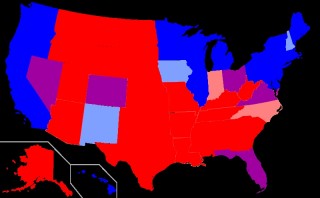Can Red and Blue States Unite to Save Democracy?
… by Dr. Stuart Jeanne Bramhall

One news item receiving virtually no corporate media attention is that thirty-eight state legislatures have officially requested a constitutional convention under Article V of the US Constitution. There has only been one constitutional convention – the first – in 1787. Article V requires Congress to call a constitutional convention if 2/3 of (34) states request one.
Most, but not all the resolutions are from red states calling for a balanced budget amendment. However two blue states, California and Vermont, have requested a constitutional convention to end corporate personhood and restrict corporate funding for elections.
Tallying the numbers is a bit complicated. According to the Congressional Record, forty-nine states* have requested constitutional conventions. Eleven of these forty-nine states later rescinded their requests.
_________________________
ALEC Seeks to Restrict Delegate Freedom
Forbes Magazine argues you also have to subtract the states which have passed a delegate limitation act. This would prohibit delegates from considering any amendments other than those requested by their state.
The American Legislative Exchange Council (ALEC), the lobby group founded and funded by the billionaire Koch brothers, is very keen to see all states pass a delegate limitation act and have even drafted model legislation.
ALEC and the corporations they represent believe the delegates to a constitutional convention must be closely controlled to prevent a runaway convention from passing amendments unfriendly to corporate interests – e.g. an amendment ending corporate personhood and limiting the ability of corporations to overrule state and municipal laws. Three states (Georgia, Indiana and Florida) have passed delegate limitation legislation. Another seven states (Idaho, Michigan, New Hampshire, Oklahoma, South Dakota, Virginia, and Wisconsin) are considering it.
_______________________________
Using a Balanced Budget Amendment to Abolish the Fed
Clearly ALEC is calling for a balanced budget amendment in the hope it will force the federal government to cut spending for Social Security, Medicare and other social programs. This strategy could backfire if it leads to a debate on abolishing the Federal Reserve and stripping private banks of their power to create money.
Eliminating federal debt will be extremely difficult, if not impossible without scrapping a system in which nearly all our money is produced as debt (i.e. loans by private banks). There’s growing grassroots support on both the right and the left to abolish the Fed (see James Corbett’s excellent documentary explaining how banks create money out of thin air.) A constitutional convention could be the ideal scenario to make this happen.
Why Red and Blue States Need to Work Together
California and Vermont are only the first of many blue states in the Move to Amend coalition seeking a constitutional convention to end corporate personhood. The vital question here is whether red states seeking a balanced budget amendment will be open to talking to blue states seeking to limit the defacto ability of corporations to overturn state and municipal laws.
The corporate media has been extremely cagey of late about magnifying the distrust and enmity between the two camps. I find this quite sad as there are many issues on which the so-called “extreme” right and left agree, like ending NSA spying, ending the wars in the Middle East, abolishing the Fed, restoring civil liberties guaranteed under the Bill of Rights, ending the President’s abuse of executive power and curtailing the power of the corporate oligarchy.
I think it’s a very good sign that a non-partisan group called Friends of the Article V Convention is keeping count of the states. There has been some talk the Friends may file suit if Congress fails to set wheels in motion for a constitutional convention.
States Seek Broad Range of Amendments
In addition to requesting a constitutional convention to pass amendments calling for a balanced federal budget and an end to corporate personhood, various state petitions seek amendments to limit federal income taxes, to begin negotiations for a world federation (i.e. one world government), to change apportionment for the Electoral College and the House of Representatives, to increase federal revenue sharing, to end federal interference in school management, to guarantee a right to life, to end unfunded federal mandates, to end judicial taxing power, to establish term limits for federal office holders and to restrict new laws to a single subject.
There are a few more I would add to this list, including constitutional amendments abolishing the Electoral College, restoring Posse Comitatus and limiting the ability of the President to rule via executive order. I’m sure readers have their own personal favorites.
*The 49 states which have formally requested a constitutional convention:
- Alabama: balanced budget, June 2011
- Alaska: federal fiscal restraints and term limits, April 2014
Arizona: ending judicial taxing power, Mar 1996, rescinded 2003- Arkansas: right to life amendment, May 1977
- California: abolish corporate personhood, June 2014
- Colorado: unfunded federal mandates, June 1992
- Connecticut: prohibit interstate income tax, May 1958
- Delaware: balanced budget amendment, Feb 1976
- Florida: balanced budget, term limits, limit laws to 1 subject, April 2014
- Georgia: balanced budget, Feb 2014
Idaho: limit income tax, April 1989, rescinded 1999- Illinois: increase federal revenue sharing, June 1976
- Indiana: right to life, balanced budget, 1977, 1979
- Iowa: balanced budget, June 1979
- Kansas: balanced budget, May 1978
- Kentucky: change apportionment for House, Oct 1965
- Louisiana: balanced budget, May 2014
- Maine: limit income tax, April 1941
- Maryland: right to life, Jan 1977
- Massachusetts: right to life, 1977
- Michigan: balanced budget, Nov 2013
- Minnesota: change apportionment for House, May 1965
- Mississippi: right to life, Feb 1979
- Missouri: unfunded federal mandates, Mar 1993
Montana: change apportionment for Electoral College, Mar 1973, rescinded 2007- Nebraska: balanced budget, April 2010
- Nevada: right to life, unfunded federal mandates, June 1979
- New Hampshire: balanced budget, May 2012
- New Jersey: right to life, April 1977
- New Mexico: balanced budget, Feb 1979
- New York: federal interference with school management, Oct 1972
- North Carolina: balanced budget, Feb 1979
- North Dakota: end judicial taxing power, Mar 1996
- Ohio: balanced budget, Nov 2013
Oklahoma: change apportionment for Electoral College, May 1965, rescinded 2009Oregon: balanced budget, Feb 1979, rescinded 1999- Pennsylvania: balanced budget, Feb 1979
- Rhode Island: right to life, May 1977
South Carolina: balanced budged Feb 1979, rescinded 2004South Dakota: unfunded federal mandates, rescinded 2010- Tennessee: balanced budget, April 2014
- Texas: balanced budget, Mar 1979
Utah: right to life, rescinded 2001- Vermont: corporate personhood, April 2014
Virginia, change apportionment for House, May 1964, rescinded 2004- Washington: change apportionment for House, Mar 1963
West Virginia: increase federal revenue sharing, Jan 1971, rescinded 2001- Wisconsin: change apportionment for Electoral College, Mar 1963
Wyoming: change apportionment for House, mode of amending constitution, Feb 1963, rescinded 2009
Photo credit Wikimedia Commons and Wikipedia Commons
Editing: Jim W. Dean
__________________________________
Dr. Bramhall is a retired American child and adolescent psychiatrist, activist and political refugee in New Zealand.
Her first book The Most Revolutionary Act: Memoir of an American Refugee describes the circumstances that led her to leave the US in 2002. She has also published two young adult novels about political activism: The Battle for Tomorrow: A Fable
View All Books by Dr. Bramhall >>>
She is involved in the national leadership of the New Zealand Green Party and has a political blog at StuartJeanneBramhall.com
ATTENTION READERS
We See The World From All Sides and Want YOU To Be Fully InformedIn fact, intentional disinformation is a disgraceful scourge in media today. So to assuage any possible errant incorrect information posted herein, we strongly encourage you to seek corroboration from other non-VT sources before forming an educated opinion.
About VT - Policies & Disclosures - Comment Policy





